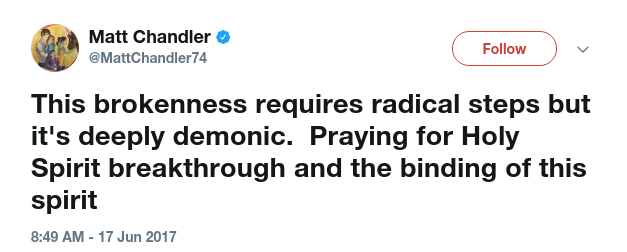Matt Chandler is a curious figure. As a well-known and popular pastor with a charming personality and enough charisma to attract a massive following, his words and opinions never go unnoticed. Opinions are like…well, let’s just say like everyone else, he has one–and he has one on everything.
In a recent tweet which appears to be in response to the court’s recent decision on the Philando Castile shooting, Chandler says,
This article is not an opinion on the court’s decision or Chandler’s apparent disapproval of the court’s decision. What I intend to address is the futility of Chandler’s prayer for the Holy Spirit to “bind” what he believes to be a demonic spirit behind sin.
The binding and loosing of spirits is a practice of “spiritual warfare” typically found in Charismatic and Word of Faith circles. In this practice, Satan and his demons are said to be the cause of various calamities and are continually subjected to verbal binding by prayer. One of the primary verses used to support this practice is Matthew 16:19, “I will give you the keys of the kingdom of heaven, and whatever you bind on earth shall be bound in heaven, and whatever you loose on earth shall be loosed in heaven,” and Matthew 12:28-29, “But if it is by the Spirit of God that I cast out demons, then the kingdom of God has come upon you. Or how can someone enter a strong man’s house and plunder his goods, unless he first binds the strong man? Then indeed he may plunder his house.”
First, we will deal with Matthew 16:19. The problem with the spiritual warfare warrior’s interpretation of this verse is that it is not suggesting that we have any power to restrict evil spirits or sin, the reference to “binding and loosing” is purely doctrinal, in nature. In Jewish tradition, these expressions were in a sense a legal jargon that simply meant to declare something allowed or forbidden under the law. In John Gill’s commentary on Matthew 16:19, he states,
This also is not to be understood of binding, or loosing men’s sins, by laying on, or taking off censures, and excommunications; but only of doctrines, or declarations of what is lawful and unlawful, free, or prohibited to be received, or practised.[1]
To expand on this, Christ has given his apostles the keys of the Gospel, and the authority to proclaim the gospel to people and declare its promises to those who believe it and its curses to those who reject it. We can see the application of this authority in Acts 13:46,
And Paul and Barnabas spoke out boldly, saying, “It was necessary that the word of God be spoken first to you. Since you thrust it aside and judge yourselves unworthy of eternal life, behold, we are turning to the Gentiles.
and in Acts 18:6,
And when they opposed and reviled him, he shook out his garments and said to them, “Your blood be on your own heads! I am innocent. From now on I will go to the Gentiles.”
No serious expositor of the Word or biblical scholar has ever interpreted this passage as having anything to do with the restriction of demonic entities or spirits or even man’s sin from being carried out. The practice of binding and loosing spirits is not only unbiblical, it’s efficacy is unsubstantiated and is actually a particularly dangerous practice. The vacuity of the repeated salvo of verbal castigation against demonic entities proves either that God has never answered these prayers of “binding and loosing”, or that the Holy Spirit’s binding is temporary and insufficient.
Let’s turn our attention now to Matthew 12:28-29, another verse widely used to defend the practice of binding and loosing. In Matthews narrative of this parable, the word “bind” is used in verse 29, but in Luke’s version, the phraseology used is “attacks and overcomes.” (Luke 11:22) What Jesus is showing here is the absurdity of the Pharisee’s blasphemy against the Holy Spirit by suggesting that He was casting out Satan’s demons by the power of Satan and that it is Jesus who is stronger and has overcome Satan. This metaphorical application of “binding” the strong man, who is Satan, is not a prescription for a practice that needs to be continually repeated but a picture of Christ’s redemptive work on the cross.
Allen Ross states in his Exposition on the Gospel of Matthew,
Now Jesus offers another argument, as if to say, “Look at it another way” (= “or”). The point now is that if Jesus’ casting out demons cannot be explained by the power of Satan, then it all reflects an authority that is greater than Satan’s. By this point, then, the analogy can be understood. Jesus is the one who is binding the strong man, Satan, and plundering his house. The little image provides an implied comparison. The people were expecting the Messiah to come and bind Satan in the Messianic Age; and so here Jesus shows He has the power and the authority to do just that. Jesus came with the authority of heaven to defeat and destroy the works of Satan, and to rescue valuable things–people–from his house.[2]
It is clear that the modern-day practice of “binding and loosing” spirits is not a practice that can be substantiated from Scripture. God has given us the keys to the kingdom and this is by preaching the gospel to every nation. If the Holy Spirit decides to restrict demonic activity or other evil from this world, it would not be through some utterance of some magic words commanding this restriction. This practice is fraudulent and does not reflect the will of God. We know that God allows evil in this world and that He works all these wicked things out for the good of those who are called according to His purposes (Romans 8:28). Our purpose is not to formulate a mystical prayer that will somehow invoke the restraint or regulation of sin and evil in this world but to call people out of the world by the preaching of the gospel and the proclamation of Him who has already overcome sin.
I have said these things to you, that in me you may have peace. In the world you will have tribulation. But take heart; I have overcome the world.” –John 16:33
[Contributed by Pulpit & Pen]
Sources:
- Gill, John. Gill’s Exposition of the Bible, Matthew 16:19
- Ross, Allen. An Exposition on the Gospel of Matthew, 18. Beelzebub Or The Holy Spirit? (Matthew 12:22-37)












